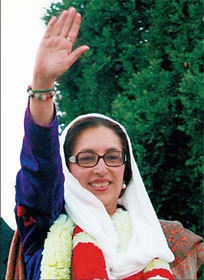World condemns 'assault on stability'
Updated: 2007-12-28 11:28
From Moscow to Washington to New Delhi and points in between, dismay and condemnation poured forth yesterday over the assassination of Pakistani opposition leader Benazir Bhutto, along with concern for the stability of the volatile region.
|
|
UN Secretary-General Ban Ki-moon expressed shock and outrage, calling the killing an "assault on stability" in Pakistan.
"I strongly condemn this heinous crime and call for the perpetrators to be brought to justice as soon as possible," Ban said in a statement.
The UN Security Council scheduled consultations at noon yesterday to discuss the killing.
US President George W. Bush demanded that those responsible for the killing of Bhutto be brought to justice.
"The United States strongly condemns this cowardly act by murderous extremists who are trying to undermine Pakistan's democracy," he said. "Those who committed this crime must be brought to justice."
Bush expressed his deepest condolences to Bhutto's family and to the families of others slain in the attack and to all the people of Pakistan.
The US president looked tense in delivering a statement that lasted about a minute and he took no questions.
In a letter to Pakistani President Pervez Musharraf, French President Nicolas Sarkozy called the attack an "odious act" and said "terrorism and violence have no place in the democratic debate and the combat of ideas and programs."
Sarkozy said Bhutto had paid "with her life her commitment to the service of her fellow citizens and to Pakistan's political life" and urged Pakistan's elections be held as scheduled on January 8.
In India, which has fought three wars against Pakistan, Prime Minister Manmohan Singh said Bhutto is irreplaceable, and noted she had striven to improve relations between the two countries.
"I was deeply shocked and horrified to hear of the heinous assassination," Singh said. "In her death, the subcontinent has lost an outstanding leader who worked for democracy and reconciliation in her country."
Bhutto's assassination "is not only bad for Pakistan," said former Indian Foreign Minister Natwar Singh. "It is bad for the entire region."
In Britain, where Bhutto had attended Oxford University, Foreign Secretary David Miliband said he was "deeply shocked" by Bhutto's death.
Italian Premier Romano Prodi said he was filled with grief and called Bhutto "a woman who chose to fight her battle until the end with a single weapon - the one of dialogue and political debate."
More terror attacks feared
In Moscow, Anatoly Safonov, Russian President Vladmir Putin's envoy on international cooperation against terrorism, expressed fears the assassination would trigger violent repercussions.
"The already unstable situation in Pakistan will be further exacerbated by this powerful factor," Safonov said, according to the Interfax news agency.
Russian Deputy Foreign Minister Alexander Losyukov, Russia's most senior Asia diplomat, told ITAR-TASS news agency. "An act of terror is a bad sign. We hereby offer our condolences. This will for certain trigger a wave of terrorism."
Oil prices up, stocks down
Oil prices rose yesterday after the killing of Bhutto raised concerns about stability in the Middle East.
"It's definitely instability," said James Cordier, president of Liberty Trading Group in Tampa, Florida. "Everybody wants calm when they're talking about pricing energy (futures)."
Light, sweet crude for February delivery rose 47 cents to $96.44 a barrel on the New York Mercantile Exchange.
The US stocks also fell after the news of Bhutto's death yesterday, as the assassination raised the possibility of increasing political unrest, always an unsettling prospect for investors.
Unrests in the streets
Angry supporters of Bhutto took to the streets of Pakistani cities yesterday, from the Himalayas to the southern coast.
The unrest was predictably fiercest in Bhutto's native Sindh province and its capital, Karachi. "Police in Sindh have been put on red alert," said a senior police official. "We have increased deployment and are patrolling in all the towns and cities, as there is trouble almost everywhere," he said.
Reports said security was deteriorating in Karachi, where thousands poured on to the streets to protest. At least three banks, a government office and a post office were set on fire, a witness said.
Tyres were set on fire on many roads, and shooting and stone-throwing was reported in many places. Most shops and markets in the city shut down.
At least 20 vehicles were torched in the central Sindh town of Hyderabad.
There were also small protests in Rawalpindi and the nearby capital, Islamabad.
Protesters blocked roads with burning tyres and chanted slogans against President Pervez Musharraf in Muzaffarabad, capital of Pakistan-controlled Kashmir in the mountainous north.
Police said they had been ordered to block the main road between Punjab province and Sindh province, apparently to stop the movement of protesters.
Disturbances were also reported in the southeastern city of Multan, although details were sketchy. In the eastern city of Lahore, Bhutto party workers burnt three buses and damaged several other vehicles, police said.
|
|
|
||
|
||
|
|
|
|
